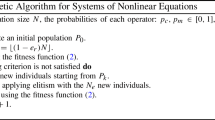Abstract
Formulizations of mutation and crossover operators independent of representation of solutions are proposed. A kind of precisely quantitative Markov chain of populations of standard genetic algorithms is modeled. It is proved that inadequate parameters of mutation and crossover probabilities degenerate standard genetic algorithm to a class of random search algorithms without selection bias toward any solution based on fitness. After introducing elitist reservation, the stochastic matrix of Markov chain of the best-so-far individual with the highest fitness is derived. The average convergence velocity of genetic algorithms is defined as the mathematical expectation of the mean absorbing time steps that the best-so-far individual transfers from any initial solution to the global optimum. Using the stochastic matrix of the best-so-far individual, a theoretic method and the computing process of estimating the average convergence velocity are proposed.
Similar content being viewed by others
References
Holland J H. Adaptation in nature and artificial systems[M]. Cambridge: The MIT Press, 1992.
Bäck T. Order statistics for convergence velocity analysis in simplified evolutionary algorithms [A]. Whitley D and Vose M, eds. Foundations of Genetic Algorithms[C]. San Mateo CA: Morgen Kaufmann, 1995. 91–102.
Bäck T. The interaction of mutation rate, selection and self-adaptation within a genetic algorithm [A]. Männer R and Manderick B, eds. Parallel Problem Solving from Nature [C]. Amsterdam: Elsevier, 1992. 85–94.
Rudolph G. Convergence analysis of canonical genetic algorithms [J]. IEEE Transactions on Neural Network, 1994, 5(1): 96–101.
Suzuki J. Markov chain analysis on simple genetic algorithms [J]. IEEE Transactions on System, Man and Cybernetics, 1995, 25(4): 655–659.
Reynolds D and Gomatam J. Stochastic modelling of genetic algorithms [J]. Artificial Intelligence: 1996, 82: 303–330.
Goldberg D E, Deb K. A comparative analysis of selection schemes used in genetic algorithms [A]. Rawlins G J E, ed. Foundations of Genetic Algorithms [C]. San Mateo CA: Morgen Kaufmann, 1991. 69–91.
ZHANG B T. Comparison of selection methods for evolutionary optimization [J]. Evolutionary Optimization, 2000, 2(1): 55–70.
SEN Ding-xuan. Stochastic process (in Chinese) [M]. Wuhan: Press of Huazhong University of Science and Technology, 1990.
Author information
Authors and Affiliations
Additional information
Foundation item: The National Natural Science Foundation of China (No. 59835170)
Biography of the first author: GUO Guan-qi, Dr., associate professor, born in 1963, majoring in evolutionary computation.
Rights and permissions
About this article
Cite this article
Guo, Gq., Yu, Sy. Stochastic analysis and convergence velocity estimation of genetic algorithms. J Cent. South Univ. Technol. 10, 58–63 (2003). https://doi.org/10.1007/s11771-003-0071-1
Received:
Published:
Issue Date:
DOI: https://doi.org/10.1007/s11771-003-0071-1




